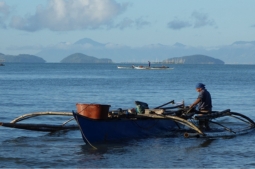Aware, informed, empowered, capacitated
To achieve the recommendations in the SSF Guidelines, one must know about, understand and apply them. Therefore, raising awareness about them is a key part of implementing them. It is also important to understand the situation, challenges and opportunities facing small-scale fisheries around the world, and to use this knowledge to inform policies and decisions to support sustainable fisheries and community livelihoods.
Change has to happen at national and local levels. For that, fishers and fish workers need to know their rights and have ways to realize them. Organisations to carry the voice of fishers and fish workers to policy- and decision-makers must be supported and empowered. Likewise, policy- and decision-makers need the tools and capacity to engage small-scale fishers. All actors need a supporting structure that makes it easy for them to exchange ideas and concerns, and collaborate to make a difference. There is also a need to measure and keep track of progress.
The SSF Guidelines promote a human-rights approach, which goes beyond the fisheries value chain to address gender, social development, employment, climate change, disaster risks and trade. Implementing the SSF Guidelines is therefore also contributing to achieving the Sustainable Development Goals (SDGs). In FAO efforts to implement the SSF Guidelines include: Raising awareness; Strengthening the science-policy interface; Empowering stakeholder; Supporting implementation.
Events
The implementation of the SSF Guidelines is supported through awareness raising at events around the world. This outreach highlights the important role that small-scale fisheries play in the context of food security and poverty eradication. It also raises visibility of the SSF Guidelines as a tool to secure sustainable small-scale fisheries, and supports the integration of small-scale fisheries in relevant global agendas. Learn more about events on the News and Events page.
Guidance material and communication tools
Awareness is also raised through handbooks, compilations of good practices, and other guidance material that help explain what it means to apply the SSF Guidelines in practice. In addition, FAO is producing various communication tools to inform the global community about the SSF Guidelines. For instance, overviews of the themes in the SSF Guidelines can be found on the SSF Guidelines page. All of the SSF Guidelines guidance materials and communication tools can be found on the Resources page.
There is a need to strengthen the science-policy interface in support of small-scale fisheries, so that policy reform can lead to increased integration of sustainable resource management with social and economic development. To achieve this, it is necessary to improve capacities of governments and other stakeholders to develop and strengthen legal, regulatory, and policy frameworks for the application of the principles of the SSF Guidelines.
FAO provides technical support and legal assistance to review policy and legal frameworks, with the goal of creating an enabling environment for implementing the SSF Guidelines. FAO also promotes exchange of related experiences by identifying, documenting and sharing good practices, and encourages the use of such knowledge to support policy reforms.
Improved data and knowledge can support implementation of the SSF Guidelines around the world. FAO, in partnership with World Fish and Duke University, undertaking a large study to better quantify the contribution of small-scale fisheries to sustainable development. Find out more about the ongoing study on the Facts and Figures page.
Actors like academia, research institutes, regional organisations and NGOs can contribute to generating knowledge and supporting capacity development and are important partners to be involved in implementing the SSF Guidelines.
FAO aims to strengthen collaborations between multiple actors to create a supportive environment for implementing the SSF Guidelines. As an example, FAO encourages and supports partnerships and learning exchanges between actors. FAO is also helping to establish and strengthen national and regional level platforms with cross-sectoral representation and strong participation of fisher and fish worker organizations to address issues of priority to the members.
To make sure the implementation of the SSF Guidelines is carried out in a coherent and participatory manner, FAO is setting up the Global Strategic Framework, as a partnership mechanism for identifying synergies, combining efforts to advocate for change and mobilize resources, and for sharing learning and experiences.
FAO is also developing a monitoring system to track progress toward implementation of the SSF Guidelines.
Institutional mechanisms and informed, capable stakeholders are essential for participatory implementation of the SSF Guidelines. Thus developing the capacity of stakeholders – including governments, public institutions, fishers, fish workers and their organizations – is an important aspect of implementing the SSF Guidelines.
FAO offers support and capacity development to organisations and institutions in a number of ways. For instance, stakeholders can get support to come together to work out action plans on how to implement the SSF Guidelines, be offered trainings, and more.
FAO also works in close collaboration with national, regional and international partners to strengthen the capacities of governments and public institutions to support sustainable small-scale fisheries governance and contribute to food security and sustainable livelihoods. Learn more about our partners on the Partners page.






